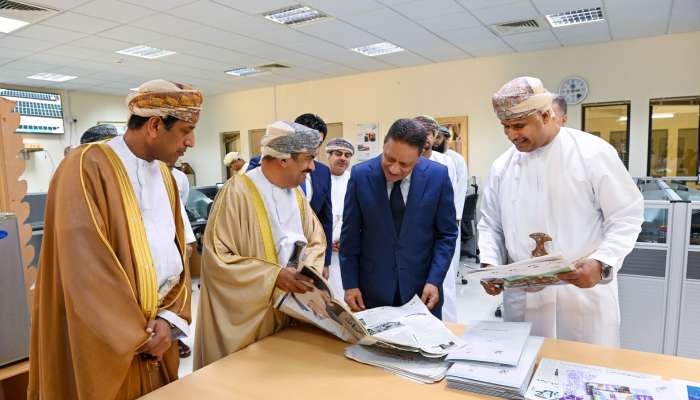
Muscat: Karam Gabr, Head of the Supreme Council for Media Regulation (SCMR) of the Arab Republic of Egypt, on Wednesday visited Oman News Agency (ONA), the News Centre, Digital Studios Complex and Oman Newspaper building.
During the visit, the guest listened to a briefing about Omani media and news content provided by the Ministry of Information, represented by the institutions he toured. He also took note of their advanced technical equipment and programmes aimed to keep pace with the need for prompt media action.
In a statement to ONA, the official commended the advanced level of Oman-Egypt bilateral relations. He stressed that the two countries possess rich civilizational, intellectual and technical components that inspire them to cooperate and exchange expertise in all fields.
Karam Gabr pointed out that the media plays a significant role in establishing closer relations between countries and peoples. He explained that the media can bridge gaps, furnish common areas among nations and encourage them to better communicate with each other. In this context, he underscored the media’s role in spreading awareness about means of affirming the national identity of different peoples, notably youth, by instilling a sense of belonging, love of the homeland and a keenness to safeguarding its gains.
The Egyptian official also spoke about the role of the media in handling the technology revolution that stems from communication, noting that "media content should be compatible with our societies’ values, ethical, religious and legal aspects".
The Egyptian official laid emphasis on maximizing the positive aspect of social media platforms and avoiding negative phenomena (including violence and extremism), which, he said, often emerges through inadvertent broadcasting of “media content that conflicts with our societies’ religious values, customs and traditions”.
He also cautioned that many issues and challenges are currently posed to print media, including an observable decline in reading rates and a shrinkage in the volume of advertisements and resources in general. He added that this challenge is after all global rather than being associated with specific countries. Yet, he affirmed that the print press would continue to be part of the soft power of societies.